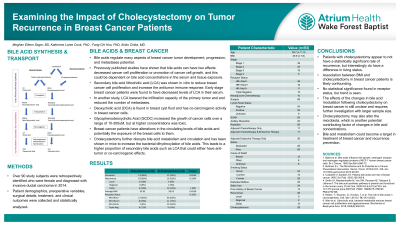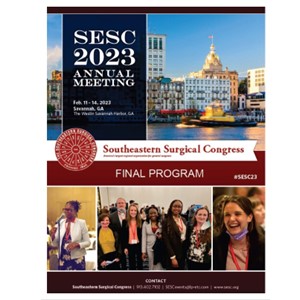Back

Breast
Category: Quickshot Oral Session 11
Quickshot Oral : Quickshot Oral Session 11
EXAMINING THE IMPACT OF CHOLECYSTECTOMY ON TUMOR RECURRENCE IN BREAST CANCER PATIENTS
Sunday, February 12, 2023
7:00am – 8:00am East Coast USA Time


Meghan Seger
Medical Student
Atrium Health Wake Forest Baptist, United States- AC
Akiko Chiba, MD
United States
Presenter(s)
Principal Contact(s)
Objectives: Previously published studies have found that bile acids influence the growth of breast cancer in vitro, thus suggesting that naturally occurring bile acids may also influence the growth of human breast cancer cells. Specifically, murine and bench experiments demonstrated that the secondary bile acid lithocholic acid in lower concentrations reduced cancer cell proliferation. Therefore, women who have undergone a cholecystectomy could be at lower risk of breast cancer development, progression, and recurrence due to altered modulation of bile acid metabolites. Further data suggesting the importance of bile acids in modulating breast tumorigenesis would highlight the potential to target bile acid metabolites in treatment and impact breast cancer development and recurrence. This study examined the outcome of women with breast cancer and a cholecystectomy as compared to those with intact gallbladders.
Methods: Over 200 study subjects were retrospectively identified who were female and diagnosed with invasive ductal carcinoma in 2014-2015. Patient demographics, preoperative variables, surgical details, treatment, and clinical outcomes were collected.
Results: Of the 200 patients in the study, 54 had a cholecystectomy (27%) and 146 did not (73%). Median follow up time was 15.7 years for the cholecystectomy group and 14.2 years for the non-cholecystectomy group. Fifteen patients with a cholecystectomy had a recurrence (28%) and 39 did not (72%). Of the patients who did not have a cholecystectomy, 35 had recurrence (24%) and 111 had no recurrence (76%). There was no significant difference in the breast cancer recurrence in those with cholecystectomy versus no cholecystectomy (p= 0.5811). The time to recurrence in those with cholecystectomy compared to intact gallbladders also showed no significant association (p= 0.6781). Analysis of a shorter follow up time was not significant for an association between cholecystectomy and 5-year recurrence (p=0.8999).
Conclusion: Women with breast cancer and a cholecystectomy had no statistically significant difference in breast cancer recurrence compared to those with intact gallbladders. Although in vitro studies have evidence supporting the modulation of breast cancer growth by bile acids, this study did not find a significant difference in short or long term recurrence outcomes. Further study with a larger patient population including a multi-institution study may lead to statistically significant difference. More extensive understanding of naturally occurring bile acids in breast cancer development may aid physicians in further identifying treatment targets.
Methods: Over 200 study subjects were retrospectively identified who were female and diagnosed with invasive ductal carcinoma in 2014-2015. Patient demographics, preoperative variables, surgical details, treatment, and clinical outcomes were collected.
Results: Of the 200 patients in the study, 54 had a cholecystectomy (27%) and 146 did not (73%). Median follow up time was 15.7 years for the cholecystectomy group and 14.2 years for the non-cholecystectomy group. Fifteen patients with a cholecystectomy had a recurrence (28%) and 39 did not (72%). Of the patients who did not have a cholecystectomy, 35 had recurrence (24%) and 111 had no recurrence (76%). There was no significant difference in the breast cancer recurrence in those with cholecystectomy versus no cholecystectomy (p= 0.5811). The time to recurrence in those with cholecystectomy compared to intact gallbladders also showed no significant association (p= 0.6781). Analysis of a shorter follow up time was not significant for an association between cholecystectomy and 5-year recurrence (p=0.8999).
Conclusion: Women with breast cancer and a cholecystectomy had no statistically significant difference in breast cancer recurrence compared to those with intact gallbladders. Although in vitro studies have evidence supporting the modulation of breast cancer growth by bile acids, this study did not find a significant difference in short or long term recurrence outcomes. Further study with a larger patient population including a multi-institution study may lead to statistically significant difference. More extensive understanding of naturally occurring bile acids in breast cancer development may aid physicians in further identifying treatment targets.

